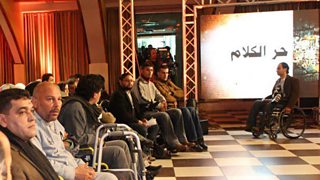"This episode was different"
Lana Shehadeh
Research Officer for 主播大秀 Media Action in the Palestinian Territories
Right from the start, this episode was different. This episode was dear to our hearts.
Because in this episode of the Palestine Territories' TV debate show Hur el Kalam (Free To Speak), people with disabilities were going to get the chance to get their voice heard.聽

The atmosphere was electric in the Al-Zahra hall in Ramallah as it began to fill up with the audience, who included wheelchair users, people with visual impairments, representatives from Palestine's Association of the Deaf and family members of people with a disability.
On the stage were the panellists, the Minister of Social Affairs Majida Al-Masri and Shatha Abu Suroor, a representative from the General Palestinian Union for People with Disabilities.
Legal protection
The rights of the 7% of the Palestinian population who have a disability are protected in Palestinian law. Since 1999, for example, it's been law that 5% of jobs in public institutions should be taken by people with disabilities and that disabled people have a right to services as well as access to public places.
But the reality is quite different, according to Yana Zayed, manager for the disability programme at Medical Aid for Palestinians.
"Unfortunately this law is not implemented. It is difficult because the Palestinian Legislative Council is inert and there is no official body taking the issue seriously enough to hold accountable institutions that do not follow the law," she told our research team while they were preparing for the show.
Employment issues
On the night of the recording itself, 26-year-old Radi Farahat from Nablus was in the audience and took the chance to tell his story.
"I worked for the Palestinian Authority within the security forces," he said. "After a year of work, I was given a report stating that I am not capable of continuing work due to my health condition. I have difficulty walking but I am still able to walk."
In response, Minister for Social Affairs Majida Al-Masri urged Radi to read a recent law which states how government institutions should use proper explanations for why or why not an individual can continue working in a post.
But she also had another tough message for Radi. "We also must recognise that disabilities must be appropriate with the form of employment," she said. "Certain disabilities will make it very difficult for an individual to do certain jobs, and that is what we are trying to explain."
Ministry delay
Radi was not the only member of the studio audience to tell his story.
24-year-old Ahmad Dosh lives in Tulkarem Refugee Camp in the West Bank. He uses a wheelchair after a serious accident left him quadriplegic.
Ahmad graduated with honours from his university and applied to the Ministry of Education to become a teacher at a public school in Tulkarem. But even though he scored among the top applicants in an entrance test, he was told he wasn't an appropriate candidate because the schools are not accessible for people with disabilities. The ministry rejected him.
During the episode, Ahmad was able to tell the minister, "I sent an official letter to the Ministry of Social Affairs about my situation. This was approximately a year ago and I am still waiting for the response."
The minister Al-Masri replied, "I only received Ahmad's complaint two weeks ago. Once I received the complaint, I automatically sent an official letter to the Minister of Education."
But again, she stressed, “Unfortunately we must recognise that not all job posts are compatible with disabilities. Ahmad must recognise that unemployment is high and he, like most Palestinians, will face many problems finding a job."
Off camera, the minister promised to follow up on the case and since then, Ahmad has been invited to take another entrance exam and has been promised that he will be treated equally. He's now awaiting the exam results.
Passionate debate
The audience took full advantage of the opportunity to express their experience and opinions to the minister. So passionate were they that Hur el Kalam’s presenter Huda Kadoumi decided to extend the recording time by 20 minutes so that all their points could be heard.
But the minister also wanted to stress how far the Palestine Territories had come in terms of disability issues. "We need to be more positive," she said. "There are a lot of success stories and a lot of improvements we must take into consideration. I understand we have a long way to go, but we are ready to take on that challenge, and I believe we will."
The audience at Hur el Kalam will, no doubt, be sure to keep the minster at her word.
Related links
主播大秀 Media Action on and
